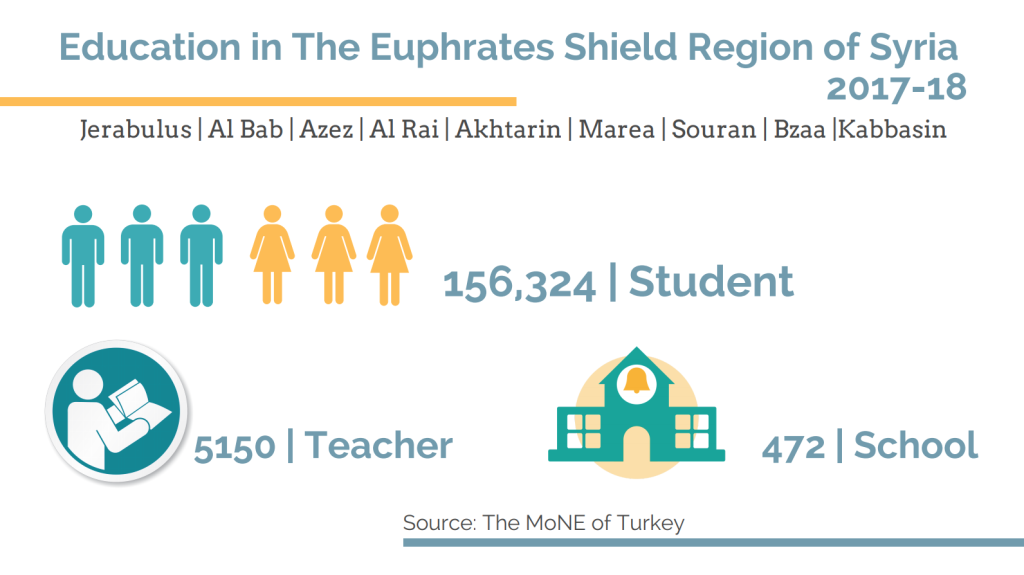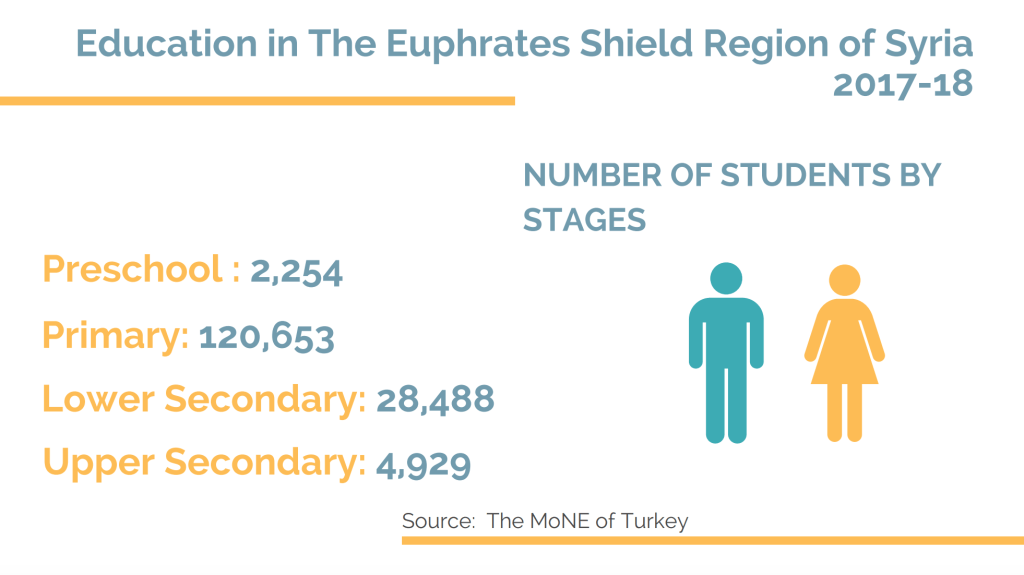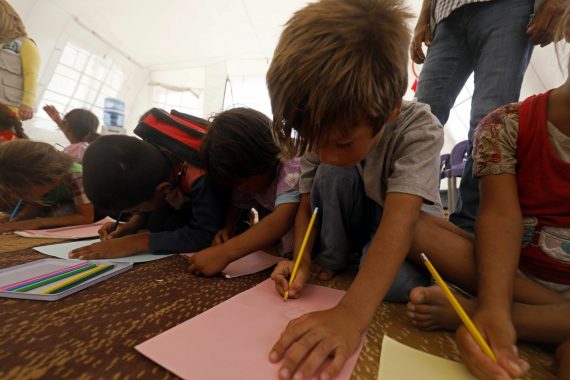When the Syrian Civil War is discussed, the discussion tends to evolve around the number of refugees, the constant attacks conducted by the Assad regime and trilateral discussions between Turkey, Iran and Russia, who are the three guarantor states seeking to find an end to the years long conflict in Syria.
One very important aspect of society that has continuously been ignored in these discussions has been education. While education has become an asset difficult to sustain in Syria, following Operation Euphrates Shield, funds from the Turkish Ministry of Education and some partner countries have been able to re-provide education to 156,324 students, repair 472 schools and ensure over 5000 teachers were back in their profession. In regards to this initiative, the Turkish government has spent 250 million Turkish Liras since 2016.

A report written by Ipek Coskun and published by the Foundation for Political and Social Research (SETA), seeks to answer gaps in the education debate in Syria. In the introduction, the report provides a briefing about the general situation of education in Syria prior to the civil war. By issuing a comparison between figures prior to the beginning of the war and the current situation, in the report, Coskun highlights that the aim is to reflect the situation Syria has found itself in since the beginning of the conflict, the affect that this situation has had on education and to provide a perspective as to how education in Syria can be developed in the future. While the report highlights the facilities provided in areas freed by Operation Euphrates Shield, it maintains that these projects should be replicated across Syria.
In conformity with Article 51 of the United Nations Charter, Turkey exercised its ‘right of self-defense’ and launched Operation Euphrates Shield on August 24, 2016. In cooperation with the Free Syrian Army, OES cleared terrorism completely from the Kilis-Gaziantep corridor and secured the control of Azaz, Jarabulus, Al-Rai, and surrounding areas. In total, the military operation cleared 1,000 km from terrorist groups including the PKK/YPG and Daesh.
After concluding the operation on March 31, 2017, the Turkish government pursued many social projects in order to ensure that the lives of people living in the liberated areas were close to normal. The most important aspect in this regard was thus education. As graphed in the report, following the liberation of areas under OES, 156,324 students, 5,150 teachers and 472 schools were located. While the education in Jarabulus, Al-Bab, Kabassin and Bizaah are coordinated by the Gaziantep Directorate of National Education, education in Azaz, Al-Rai, Akhtarin, Mare’ and Souran are coordinated by the Kilis Directorate of National Education. In regards to the breakdown of these students, according to data obtained from the 2017-2018 statistics, there are currently 2,254 pre-school students, 120,653 in nursery, 27,340 in primary, 1,148 in Imam Hatip primary schools, 4,291 in high school and 638 students in Imam Hatip high schools. The report further break downs in detail the exact year group of these students.

Recommended
Recommendations
While in the report Coskun details the facilities and education provided to Syrian students in liberated areas, in addition to this data, the conclusion section ‘Conclusion and Recommendations,’ is important to assess for the future of education in Syria.
Providing a comparison to the Bosnian War, in the conclusion it is clearly stated that as history shows us, if the conflict in Syria ends with the country breaking up into different sects, this will damage education the most. More, if one day a ceasefire and peace is secured in the country, there are two social factors that are going to struggle the most in the re-infrastructure of the failed state: 1) education and 2) human power. For these reasons, the recommendations provided in the report are important in order to lay a picture of what and how education in Syria could look like in the future.
Following the traumas of the war, whether children have had to migrate, been displaced or lost their families, it is most likely that they are going to need (and currently do need) psychological assistance. In fact, this is not only the case for children but for teachers too. Thus, for this reason, the report recommends for education facilities provided in the OES areas to be spread across Syria. This is because the system provided by Turkish authorities does not design education based on a specific ideological belief or sect of society. This is in comparison to education provided by Syria’s Ba’ath Party, which teaches children history as the party itself sees it.
In regards to providing and securing education facilities across Syria, the report calls for an independent international committee to be established with participation from Turkey, Lebanon and Jordan. This committee will be in charge of supervising the current situation in order to lay a future program. Second, the effects of terrorism on education cannot be denied. For that reason, the report recommends for operations to be conducted in order to release children from the hands of terrorist groups such as Daesh and the PKK/YPG by securing deals with their families. Third, emphasizing the need to support Syrian teachers and provide them training, the report calls for an atmosphere of assurance that Syrian teachers who are currently refugees will be able to return to their professions when they return to their country. Fourth, highlighting failures of international organizations – especially that of the United Nations – the report recommends for the UN to work with countries such as Turkey in order to conduct concise assessment needs reports.
In addition to this, considering the fact that the social system in Syria has collapsed, the report calls for a new structure in accountability, budget planning and the education of teachers. In relation to this, and within this new structure, the needs of schools should be assessed and provided in a short period of time. As we know the Syrian Civil War has destroyed cities such as Aleppo and Idlib the most. Thus, such cities should be prioritized in regards to any social facilities provided. Finally, the report calls for the education of future teachers with no ideological bias and concludes with the emphasis that the education facilities provided in OES areas should be replicated across Syria.





